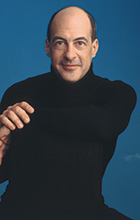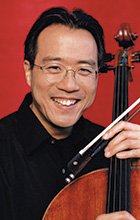Watch a Video
Conductor Robert Spano on the idea of music as a universal language.
Robert Spano interview © 2009 The Carnegie Hall Corporation.
Listen
Program Notes
THE PROGRAM
ANGEL LAM (b. 1970)
Awakening from a Disappearing Garden
Performance Time:
approximately 32 minutes
Composer Angel Lam’s music—a reflection of the beauty she finds in everyday life—has been praised as “beautiful, even ravishing at moments,” and as a “kaleidoscopic outpouring.” Ms. Lam employs a remarkable and captivating blend of the subtle and evocative expressiveness characteristic of the East Asian aesthetic. She uses the beauty of soundscape, instrumentation, and language to express the refined emotions and images that have inspired her works. Ms. Lam also writes short stories that form an integral component of her music.
Ms. Lam grew up in Hong Kong and Huntington Beach, California. During her undergraduate studies at the Hong Kong Academy for Performing Arts, she researched ancient Chinese aesthetics and Asian aesthetics in contemporary Western music. She also received numerous awards and scholarships to attend international music festivals and to study the fine arts and architecture of European cities.
She received master’s degrees in both composition and music theory from the Peabody Conservatory in Baltimore, Maryland, where she also taught music theory. She is currently a doctoral candidate at Peabody and an artist diploma candidate at Yale University. Her mentors are Martin Bresnick, Aaron Jay Kernis, and Christopher Theofanidis.
Angel Lam’s compositions have been performed throughout the US and in major cities worldwide. Most recently, her composition Empty Mountain, Spirit Rain was selected to be part of the touring repertoire of Yo-Yo Ma and the Silk Road Ensemble for performances throughout the US, Britain, Canada, China, and Japan, as well as Switzerland’s Lucerne Festival. Empty Mountain, Spirit Rain was released by Sony/BMG on Silk Road Ensemble’s CD New Impossibilities, and will be released again in a brand-new recording later this fall.
Recent and upcoming premieres and performances include works for Minnesota Orchestra, Colorado Symphony Orchestra, Yale Norfolk Chamber Music Festival, Yale Cellos, Hong Kong Arts Festival 2010, NYU Symphony Orchestra, Yale Philharmonia, Hong Kong Sinfonietta, and Australia’s Grainger Quartet.
The composer authored the narrator’s text, which she recites at this concert. Angel Lam also provided the following commentary on the work:
This is a story about two women—two different generations, two different eras—in a society that had turned our nature upside down and then upside down again ... Never changing is the spirit and face, to live, and to survive. It is all well preserved, in the memories, of our previous lives.
IGOR STRAVINSKY (1882–1971)
Le Rossignol (The Nightingale)
Performance Time:
approximately 45 minutes
About the Composer
Igor Stravinsky’s opera The Nightingale is based on a fairytale by Hans Christian Andersen. Stravinsky and his friend, Stepan Mitoussov, authored the libretto. When Stravinsky began work on The Nightingale, he was in the final years of study with his mentor, Russian composer Nikolai Rimsky-Korsakov. Rimsky-Korsakov’s death in June 1908 halted Stravinsky’s progress on The Nightingale.
In the summer of the following year, Stravinsky returned to the opera, “with the firm intention of finishing it.” But once again, fate intervened. The Russian impresario Sergei Diaghilev requested that Stravinsky compose a work for the Ballets Russes’ 1910 spring season in Paris. After some hesitation, Stravinsky agreed to the project.
On June 25, 1910, at the Opéra national de Paris, the Ballets Russes staged the triumphant premiere of Stravinsky’s L’Oiseau de feu (The Firebird), and Stravinsky’s life and career were forever changed. Two more Stravinsky ballets for Diaghilev’s company followed: Petrushka in 1911 and the path-breaking Le Sacre du printemps (The Rite of Spring) two years later.
After Le Sacre, Stravinsky returned to The Nightingale, first at the invitation of the Théâtre Libre of Moscow. Stravinsky had some misgivings about resuming work on his opera: “Only the Prologue—that is to say, Act I—was in existence. It had been written four years earlier, and my musical language had been appreciably modified since then.”
Indeed, the three-year journey from The Firebird to The Rite of Spring was a remarkable one. The immense popularity of the lush, romantic Firebird prompted Stravinsky later to dub it “that great audience lollipop.” By contrast, French conductor Pierre Monteux, who led the premieres of Petrushka and The Rite of Spring, confessed that when he first heard the latter composition, he “did not understand one note … My one desire was to flee that room and find a quiet corner in which to rest my aching head.” The premiere on May 29, 1913, at the Opéra national de Paris of The Rite of Spring inspired the most infamous audience riot in music history.
Nevertheless, Stravinsky realized that the change in his composition style might actually be beneficial to The Nightingale:
As there is no action until the second act, I told myself that it would not be unreasonable if the music of the Prologue bore a somewhat different character from that of the rest. And, indeed, the forest, with its nightingale, the pure soul of the child who falls in love with its song … all this gentle poetry of Hans Andersen’s could not be expressed in the same way as the baroque luxury of the Chinese Court, with its bizarre etiquette, its palace fêtes, its thousands of little bells and lanterns, and the grotesque humming of the mechanical Japanese nightingale … in short, all this exotic fantasy obviously demanded a different musical idiom.
Stravinsky completed the score of The Nightingale on March 28, 1914. Prior to that time, the Théâtre Libre suffered a financial collapse. And so, Diaghilev’s Ballets Russes presented the world premiere at the Opéra national de Paris on May 26, 1914. With “sumptuous scenery and costumes” by Alexandre Benois and Monteux’s expert musical direction, “the opera was (according to Stravinsky) performed with the utmost perfection.”
About the Work
The Nightingale is in three brief acts. The first act takes place in a forest by the sea, at dawn. A Fisherman sings, awaiting the arrival of the Nightingale. The Nightingale appears, and enchants the Fisherman with its beautiful song. Members of the court of the Emperor of China, led by the Cook, enter the forest in search of the Nightingale. The courtiers mistake the mooing of a cow and the croaking of frogs for the song of the Nightingale. The courtiers finally discover the Nightingale, and invite it to go with them to the palace to sing for the Emperor. The act closes with a reprise of the Fisherman’s song.
The second act takes place in the Emperor’s palace. Everyone awaits the appearance of the Nightingale. A march signals the entrance of the Emperor of China. At the Emperor’s command, the Nightingale begins to sing. The Emperor is captivated by the Nightingale’s beautiful song. Three Japanese envoys arrive with a gift from their Emperor—a mechanical nightingale. The real Nightingale is offended and flies away. The Emperor condemns the Nightingale and bestows an honor upon its mechanical counterpart. The Emperor and his court leave. The Fisherman’s voice returns, praising the Nightingale’s song.
The third act takes place in the Emperor’s bedchamber. The Emperor, mortally ill, lies on his bed. Death sits at the Emperor’s bedside, wearing the imperial crown and holding the sword of state and the standard. The specters of the Emperor’s past evil deeds also haunt him. When the Emperor begs for music, the real Nightingale returns and begins to sing. Death is captivated by the Nightingale’s song and agrees to return the crown, sword, and standard. Death and the specters depart. The grateful Emperor asks the Nightingale to stay in the palace forever. The Nightingale declines, and vows instead to return every night to sing for the Emperor. The courtiers, in a solemn funeral procession, enter the Emperor’s bedchamber. They are shocked to find their Emperor in robust health. The opera concludes with the Fisherman’s celebration of the power of music.
—Ken Meltzer
Program Notes Ó 2009, Woodruff Arts Center, Atlanta, Georgia.



